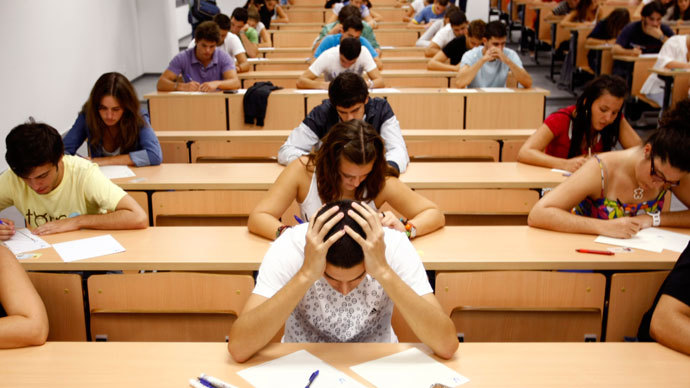‘Golden press’: Teenage mental illness soars in wealthy US, UK families

Mental health problems in children from wealthy US and UK families soar, new research reveals. The richer sectors of society are facing a crisis of eating disorders, drug abuse and self-harm, mostly due to “unrealistic” expectations pinned on kids.
Wealthy parents expect their off-springs to excel in all fields,
including sports and music, as well as academically, American
psychologists claim. This turns even activities once thought to
be for fun or for leisure purposes into a stressful experience.
“Studies show that on average, serious levels of depression,
anxiety or somatic [physical] symptoms occur twice as often among
these [wealthier] boys and girls compared to national rates,”
writes the study’s author, Suniya Luthar, in the research
published in Psychology Today and the Journal of Development and
Psychopathology.
Scientists involved in the research found that children who were
from households with an overall income of $160,000 were
experiencing double the standard rates of anxiety and depression
than their less wealthy counterparts.
Luthar explained that “some [pressure] comes from the
families. There are high pressure traps that white-collar parents
more than others, can fall into,” adding that the source of
pressure can be from parents, teachers, coaches and peers –
“the entire community.”
It is claimed that the incessant pressure being heaped on the
nation’s youth led to increased feelings of vulnerability and
children feel they cannot live up to the standards their parents
set. Pressure can be applied from a young age with competition
for school places and primary school tests beginning early on.
“The evidence suggests that the privileged young are much more
vulnerable than in previous generations. I have spent the last
decade researching why this is the case. The evidence points to
one cause: the pressure for high octane achievement,” Luthar
told the Telegraph. Existing pressure is enhanced by the
necessity in later years to secure a place at a leading
university.
Researchers also discovered that drug abuse, eating disorders,
neuroses and self-harm were rapidly rising among wealthy teens.
A never-ending cycle of exams and targets which causes the
children to become “shattered” by a “fear of
failure,” is to be blamed, according to Professor Tanya
Byron, who treats children at a London clinic. She told Britain’s
Telegraph that she was treating more and more young people for
anorexia, self-harming and depression.
However, the highest rates of mental illness are still found in
children from the very poorest families. Luthar has conducted
previous research exploring the “draining, restrictive
effects” of poverty. Income inequality has been found to
cause stress, frustration and family disruption, filtering into
further problems.














